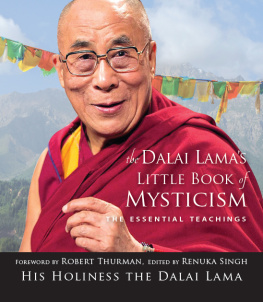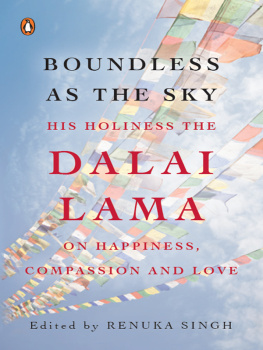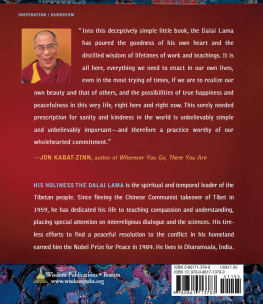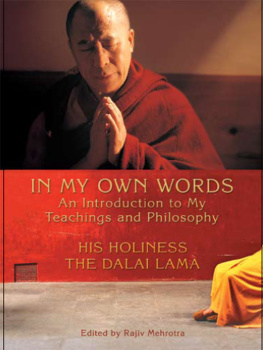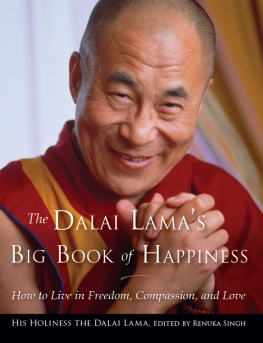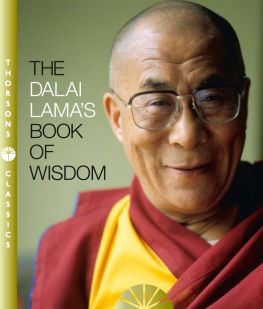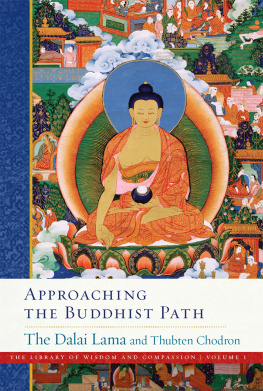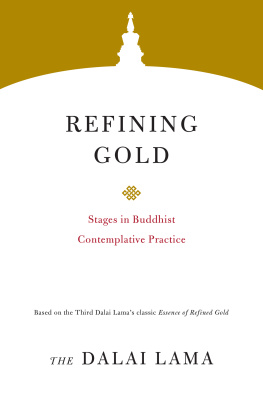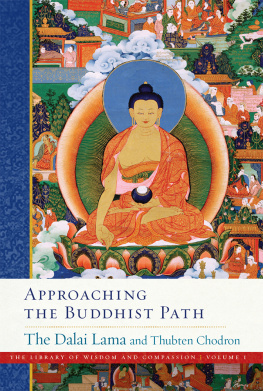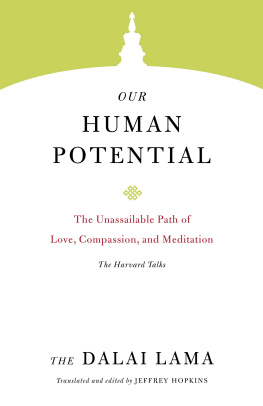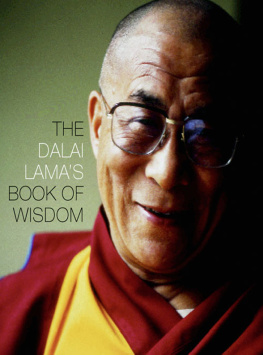
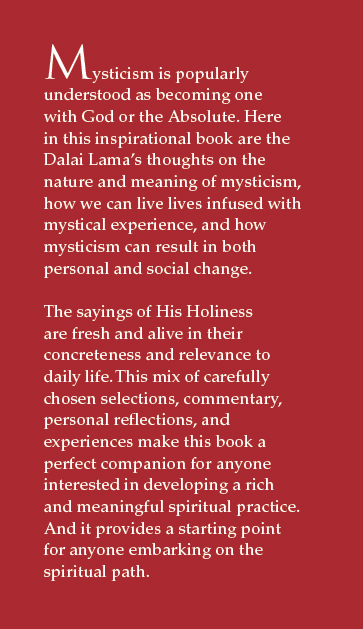

Copyright 2017
by Renuka Singh and His Holiness the Dalai Lama
Foreword copyright 2017 Robert Thurman
Robert Thurman is the Jey Tsongkhapa Professor of Indo-Tibetan Buddhism, Columbia University; president, Tibet House US; author of Man of Peace: The Illustrated Life story of the Dalai Lama of Tibet (2016)
All rights reserved. No part of this publication may be reproduced or transmitted in any form or by any means, electronic or mechanical, including photocopying, recording, or by any information storage and retrieval system, without permission in writing from Red Wheel/Weiser, LLC.
Reviewers may quote brief passages.
Cover design by Jim Warner
Cover photograph The Dalai Lama Creative Commons.
Buddhist praying flags over the mountains, China dinozzaver/Shutterstock
Hampton Roads Publishing Company, Inc.
Charlottesville, VA 22906
Distributed by Red Wheel/Weiser, LLC
www.redwheelweiser.com
ISBN: 978-1-57174-780-8
Library of Congress Cataloging-in-Publication Data available upon request
Printed in Canada
MAR
10 9 8 7 6 5 4 3 2 1
www.redwheelweiser.com
www.redwheelweiser.com/newsletter

Contents
Foreword
T he Sakya monk Tenzin Gyatso, the Great Fourteenth Dalai Lama of Tibet, seems to me to be exactly what Sakyamuni Buddha himself would be if that supposedly long-deceased buddha being were to emanate himself back onto this planet, his very own buddha-land called Saha (The Tolerable), at this moment in its history. That is to say, the Dalai Lama is fully wise about the realities with which he is engaged; tirelessly compassionate toward all of us suffering beings who are struggling against the seemingly implacable forces of egotism and selfishness that are destroying the viable life-space on the planet; and impeccably competent in his thoughts, words, and physical deeds as driven by the spontaneous and highly sophisticated art that introduces beings to the possibility of their own liberation from suffering.
What was said about Tsongkhapa (13571419), the beloved teacher of Gendun Drubpa (13911474)the Dalai Lama's first formally (though retroactively) recognized incarnation in Tibetcan also be said about our Dalai Lama, Tenzin Gyatso (1935):
You are Avalokiteshvara, great treasure of unconditional love, Manjushrighosha, prince of taintless intuitive knowledge, and Vajrapani, Mystic Lord, conqueror of the host of demonsO Tsongkhapa, crown jewel of enlightened sages of the Land of Snows, I bow down at your feet, famously good-hearted Losang Drakpa!
Once again, I am honored and pleased to welcome a set of eminently useful, pithy teachings of the good friend of us all, H. H. Dalai Lama, skillfully collected and arranged by Dr. Renuka Singh. The best model of the guru in Indian and Tibetan Buddhist tradition is precisely the good friend (Skt. kalydnamitra; Tib. geway shenyen or Geshey), which emphasizes the fact that we must save ourselves from suffering, with the help of skillful and virtuous friends, rather than merely looking to divine or human authorities to save us.
The bad news for us timid seekers of refuge is that no one, divine or human, however great and powerful, can save us from the seemingly endless sufferings constantly heaped upon us due to our misunderstanding of our relationship to a seemingly alien universe. The good newsand it is really goodis that we are already, beginninglessly, enfolded in the blissful freedom of an ultimate reality that is infinitely abundant in its sustaining energy. So we do actually have the opportunity and ability to free ourselves from our misunderstanding of that reality that causes us to fear and fight and shut ourselves off from its blessingswith the help of the good friends (enlightened beings) who have already at least somewhat transformed their own misunderstanding and fear into wisdom and love.
Among the good friends around today, the brilliant, good-hearted, and competent Dalai Lama stands out as exceptionally effective in his mastery of the art of opening our eyes, expanding our intelligence, and energizing our hearts to see through our confused ideas, discover what is obviously beautiful before us, and arise from our depressed and bitter thoughts of self-dissatisfaction and despair to relate to others in the kind and loving ways that give relief. He himself is a prime example of how joyful a person can be, even in great adversity, as he has been continually beset with extreme mistreatment by powerful enemies, which might be considered sufficient reason to be traumatized, outraged, fearful, and despairing. But here's his secret:
For Buddhists, nirvana, or the true state of cessation of suffering, is the actual refuge. It is our undisciplined state of mind that causes our suffering. If we can eliminate the causes of suffering, we will attain the state of liberation or nirvana, or a true and lasting happiness.
A person becomes a Buddhist by taking refuge. But the Dalai Lama does not seek converts, does not urge people to become Buddhists, out of respect for other religions. However, in this little saying from the work below, qualified for Buddhists, not to pressure others to agree by fiat, he reveals why he remains happy, no matter how many difficulties he and his people face. He has followed the Buddha's discovery and teaching and has found that reality itself is the state of nirvana, freedom from suffering and true happinessthe word lasting meaning beyond even pain and death. So just by transforming the mind, exploring reality and discovering its true nature, one finds real refuge from suffering. No need to become a Buddhist!
When I think of this little saying, I realize where I learned my shortest answer to the frequent question I encounter: What is Buddhism? I always say, nowadays, Buddhism is just realism! Since, as a matter of fact, not a matter of religious belief, Buddha discovered that reality is actually the bliss of freedom and love; the more realistic we are, the happier we will be. Some people say, Ignorance is bliss, because they think reality is frightening and ultimately awful. Buddha and the Dalai Lama say, Reality is bliss, therefore ignorance causes suffering; knowledge conquers ignorance, and so actually wisdom is bliss!
The seemingly simple sayings Dr. Singh has assembled, when contemplated over time with a modicum of concentration, overflow with depth of meaning that provides flashes of such wisdom and so encourages your happiness.
The final treasure in the work are the three principles of the path: renunciative transcendencethe sure expression of compassion for yourself, letting yourself off the hook of feeling driven to accumulate relationships, wealth, fame, success, etc., so you can focus on life's purpose; universal compassion for othersexpanding your sense of identification to include others, eventually all of them, and exchanging the misery of self-preoccupation for the joy of loving devotion to others; and, most importantly, the source of such loverealistic wisdom that sees through misknowledge and discovers the fortunate reality of things and the courageous and positive attitude it supports.
Next page
